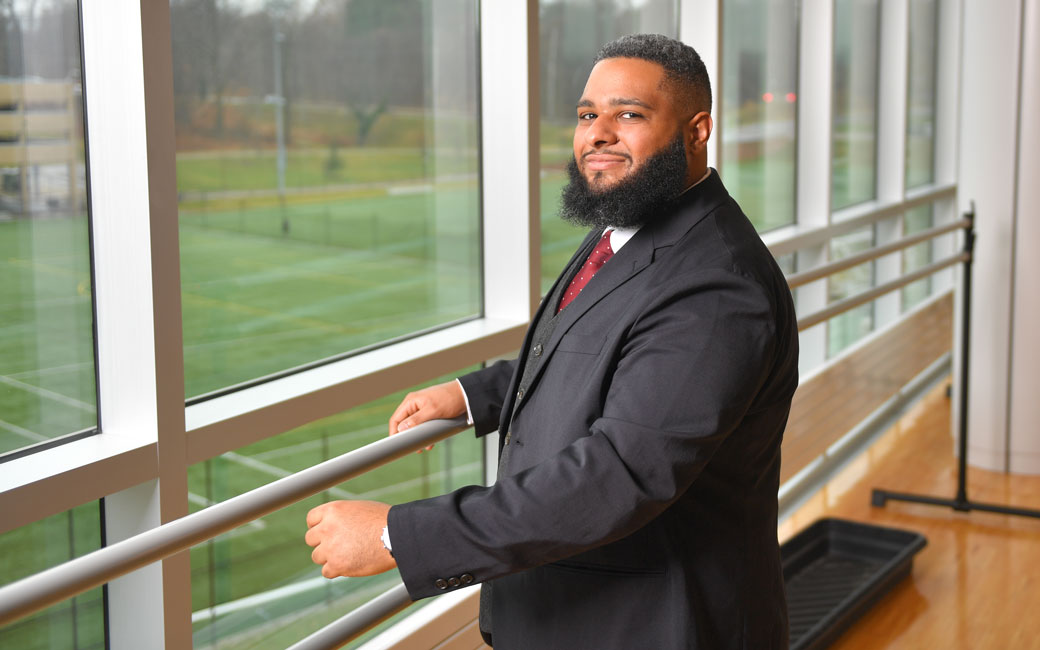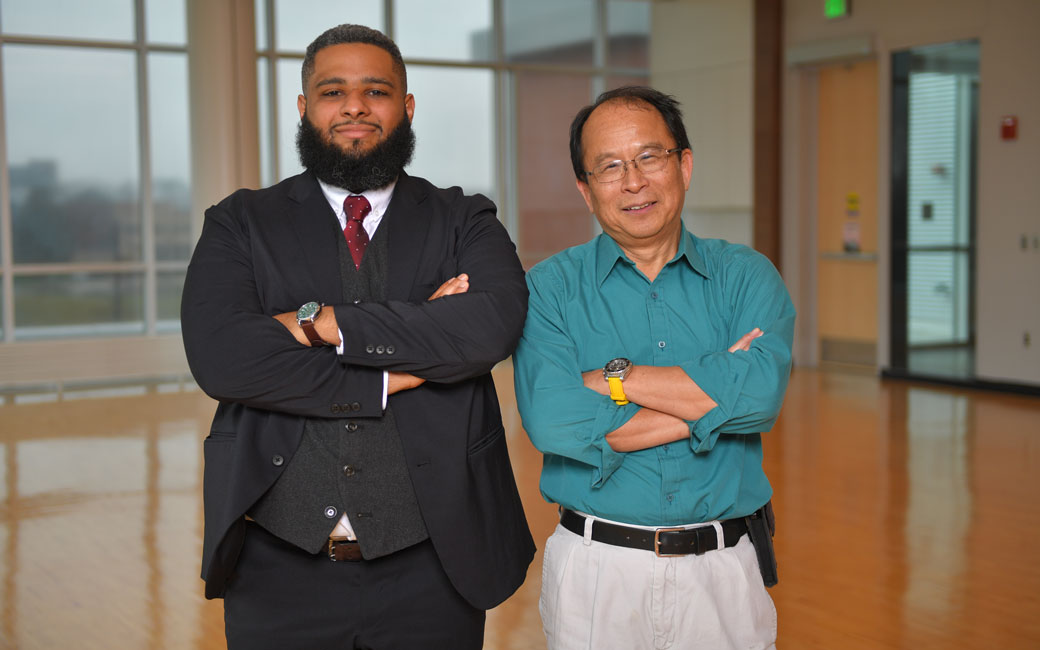Getting a traditional, non-traditional education
After being forced to drop out of high school because of injury, David Jahangiri is now graduating with a degree in exercise science
By Kyle Hobstetter on December 15, 2019

When David Jahangiri first arrived at Towson University in 2016, he didn’t have the traditional college student background.
He was a 26-year-old new student, who earned his GED after having to drop out of high school because of a spinal cord injury he suffered in high school. He’s also spent two separate parts of his life homeless (including when he was 22 and trying to get into community college).
But when he got to campus, no one cared about his age or his past. They only saw the big smile, strong work ethic and calm energy he brought to a room.
“The first place I went was the Black Student Union, and they accepted me with open arms,” Jahangiri says. “When I told them my age, nobody freaked out. Nobody cared. I was just accepted by the community here.
“And that was so important to my experience here, because if I didn’t gain that acceptance, I wouldn’t have done any of the other things I had the opportunity to experience.”
When he was thinking about going back to school, and after talking with his mom, Jahangiri says he made it his goal to have a traditional college experience. He wanted to get involved with clubs, organizations and academic opportunities on campus.
One of his biggest opportunities came through the work he did as an exercise science major. Ever since suffering his injury in high school, Jahangiri has had a passion for understanding how the body works.
So, when he had a chance to participate in a research project with kinesiology professor Elin Lobel, he jumped at it. The research studied the differences and similarities between the bodies and motion of dancers and track athletes.
“It was an amazing experience, because I was able to conduct these types of tests, that provide experience that’s invaluable if I want to get into the clinical side of my major,” Jahangiri says. “We got to work with a metabolic cart that costs over $50,000. This is a tool that most students don’t get to use, and it was just an amazing experience.”
Before going back to school, Jahangiri also got back into sports. During this down time, he coached football and wrestling at Laurel High School, as well as the Maryland Blackhawks, a semi-pro football team. Even when Jahangiri was homeless, he wouldn’t miss a practice on his schedule.
And while his injury led him down the path of health, it was his experience as a youth coach that truly cemented what he wanted to study at TU. He wanted to be in health, but didn’t want to be a doctor and didn’t want to be on the business side with health management. He wanted to help people, and felt the best way he could do that was through exercise science.
After spending the past few years in the program, and gaining experience like he had with Lobel, Jahangiri is confident in his decision.
“We have a lot of really great professors who have done fantastic research and have worked in their field clinically,” he says. “And we get a really great education that’s based upon the American College of Sports Medicine, which is the gold standard for exercise science.
“I’ve had great mentors, great guiders and great educators. They were willing to put in all the effort possible.”
Along with working in the classroom, Jahangiri kept finding different ways to get involved on campus.
One of his more interesting experiences on campus was working with Campus Recreation to teach an introductory Tai Chi class. And while it was a way to work with his exercise science background, he also used his minor — Asian Studies.
Along with understanding his body, Jahangiri has an interest in alternative medicine and alternative complementary approaches to rehabilitation and exercise. He also had an interest in both Asian culture and history.
And while he didn’t have to, he also thought he should learn the language. So, he started taking a Japanese course. It’s there where he met Japanese lecturer, and Towson University’s Director of Photographic Services, Kanji Takeno — who Jahangiri has respectfully nicknamed TakenoSensei.

It was his relationship with Kanji the professor that led him to get a job with Kanji the photographer. For the past three years, Jahangiri has helped Kanji with setting up photoshoots and carrying equipment around campus.
“It’s was great because I had no photography background at all, so I’m learning every single day on the job,” Jahangiri says. “It was another opportunity that I wouldn’t have got anywhere else in the world.
“And I got to build this relationship that not many people have with their boss. He was a boss, a teacher, a mentor, and he’s someone I looked up to.”
As he prepares to leave Towson University, Jahangiri is ready to give back to the community. After graduation, he plans to work in Baltimore City as an aftercare athletics coach and teacher. He’s also applying to Graduate Schools in hopes to study alternative medicine
Since an injury cost him a high school degree, he set a goal for himself that he wanted to have a background to understand what people are going through from both a physical and psychological standpoint.
And while he’s had some struggles, he wouldn’t trade his experiences for anything in the world.
“I don’t think people who go from high school straight to college get the same experience that I got,” Jahangiri says. “I just landed in a very unique situation, and I got the best of all worlds.
“Leaving TU, I could be a coach, a quasi-photographer, a mediation guy…I could do all these different things. And I can say that I didn’t just study it, I actually did it.”
MORE INFORMATION
Studying exercise science at TU
The exercise science program offers a comprehensive curriculum in the study of human
movement to help prepare students for a broad range of careers in the health and wellness
field. Students will develop theoretical knowledge in academic areas that include exercise
physiology, biomechanics, exercise and sports psychology, motor control, and sports
nutrition.
- Learn more about the exercise science major.
- Request information about Towson University.